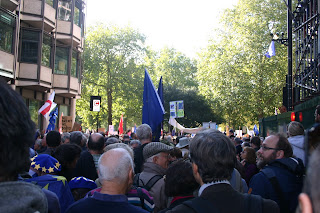The Government has put itself in a quandary. Many of the leave voters voted out because they are bigoted racists who want to stop the flow of migrants coming into the UK. Making little point in replacing the workers from the European Union with ones from, for argument's sake Bangladesh.
We could easily replace the EU migrant workers by issuing short term work visas to countries outside the EU. But what would the purpose in doing so be when the Governments #Brexit supporters want a slow down of all migrant workers?
We could easily replace the EU migrant workers by issuing short term work visas to countries outside the EU. But what would the purpose in doing so be when the Governments #Brexit supporters want a slow down of all migrant workers?
The really big problems will no doubt come from losing the more permanent workers who teach in our schools, work in our health service, manufacturing, infrastructure, building industries, banking and the rest.
The Japanese, who have traditionally not allowed foreign workers into their country, are having to change their immigration practices to allow them in to support their industries because they are faced with an ageing population.
Even little Liechtenstein which is not in the EU but is a member of the EEA and Schengen, have 50% of their residents from outside of their country.
No successful Western state can hope to compete in the world of today without a steady influx of workers.
Even if we leave with a deal and then make a trade deal with the EU it is never going to be like it is today. We will have to downsize considerably, wages will continue to stagnate, the cost of living will increase and there will be a fire sale of our assets to foreign investors.
We will have our ‘independence’ but at what cost.
The Conservatives/the Brexit party and Co. are still saying that we can have a point-based immigration policy like Australia. Julia Gillard who was Australia's Prime Minister from 2010-2013 pointed out on television last week that their immigration policy is designed to increase immigration. Whereas what the Conservatives are proposing is clearly designed to limit it as much as possible. Trying to use the same system to fix opposing ‘problems’ is bound to fail.
Our EU workforce is self-regulating, if they do not have a job then they go home. There is no need for a points-based system to fill what vacancies there are.
You may have seen homeless eastern Europeans begging on the streets in London. This is purely a failure of Government in not imposing the regulations that say we can send home anyone who has been out of work for three months.
All the problems we now have are in fact a failure of Government. Homelessness, food banks, low wages, an underdeveloped infrastructure, the destruction of the high street, the decline of our wildlife and many more. None of these things will be solved by exiting the European Union. In fact, many of them will most likely be exacerbated by it.
What hope do we now have? It is looking like the only real way out of our steadily deepening political quagmire is a short sharp shock. And Brexit will certainly give us that. Then the false promises of the Leave campaigners will be exposed once and for all. We will have the sovereignty that they have promised us but it will soon be shown to be something completely intangible. Something of no substance at all. Sovereignty will not put food on the table, educate the young or provide jobs. In fact, it will do the opposite of everything promised in the referendum. Then we can be sure that the groundswell of public opinion will take us back into the EU a lot faster than we came out of it.
I am of course fully aware that this is not the kind of rhetoric that you would expect from a pro-European political party. I am not however suggesting that we stop campaigning to remain. There is still, at this late hour, hope that the tables can be turned in our favour. But we have to face the facts, our Government has been taken over by extremists who will use any means fair or foul to get us out without a deal and then ride out the disruption that will follow.
Brexit is its own worst enemy in that it can never fulfil any of its promises if it should succeed. We have to be prepared to move once this disaster has happened and hopefully make even bigger changes to our system to benefit all citizens, not just the rich and politically elect.
In the long term, the worst-case scenario is to get a deal, this would give us two years to make a trade deal with the EU and everything else will stay as it is now for those two years. This will mean just a slow decline, whereas a no-deal will bring about an immediate tangible result which will be 100% negative. If we can not swing a remain campaign then a no-deal is the best option. Let Brexit destroy itself and discredit all of its supporters then we can move on to a brave new world of international cooperation and shared values.
Something I hope every citizen would support and believe in
 Philip Notley
Philip Notley
 Philip Notley
Philip Notley



































